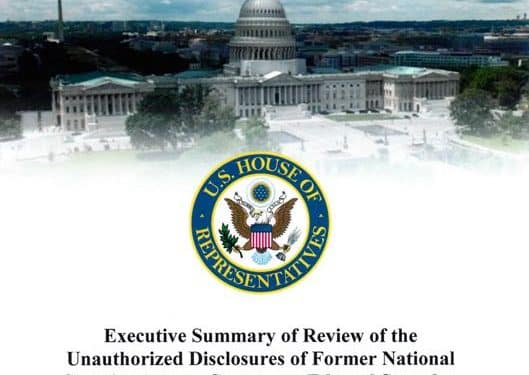In a brief 3-page report dated September 15, 2016, the House Intelligence Committee concluded that Edward Snowden “was not a whistleblower” because there were “laws and regulations in effect at the time” that “afforded him protection” and he failed to exercise those whistleblower rights. The Committee report specifically cited the Intelligence Community Whistleblower Protection Act of 1998 (IC WPA) that does permit employees, like Snowden, to make disclosures of wrongdoing to Congress if certain other conditions are met.
However, the House Intel Committee failed to state the obvious. That the IC WPA contains no whistleblower protections whatsoever if an employee were to exercise the right to disclose information about agency wrongdoing to Congress.
To make matters worse, the House Intel Committee report made the unsupportable claim that the IC WPA “affords” national security whistleblowers “with critical protections.” Indeed, it is well known that claim is not true. As a result, the House Intel Committee’s claim of whistleblower protection for national security employees, like Snowden, is knowingly false and entirely misleading.
The IC WPA, which is the only law cited by the House Intel Committee report on Snowden, does mention fear of whistleblower reprisal as a reason to justify making a whistleblower disclosure to Congress, but the statute itself provides no legal remedy to protect whistleblowers who disclose agency wrongdoing to Congress, and there were no other laws or regulations in existence to protect Mr. Snowden as a whistleblower, if he had done so in 2013.
Stephen M. Kohn, Executive Director of the National Whistleblower Center was interviewed extensively in May of 2014 by Chuck Todd of MSNBC about the lack of any meaningful whistleblower protections for national security and intelligence community. Mr. Kohn’s 2014 interview starts around 7:30 mark of the linked video.
In response to the House Intel Committee report dated September 15, 2016, Mr. Kohn had the following reaction:
“It would be professional suicide for any whistleblower in the intelligence community to rely on the IC WPA and other agency whistleblower policies,” Mr. Kohn said.
“If you make a disclosure under the IC WPA it means you are welcoming government surveillance, retaliation and criminal prosecution for leaking classified information,” Kohn added.
Unfortunately, the need to extend whistleblower protection for employees in the national security and intelligence community is not a new issue for the House Intel Committee. In fact, that Committee has been at the forefront of rejecting every major legislative reform effort to protect whistleblowers in the intelligence community over the last decade.
After the House Intel Committee succeeded in blocking any national security whistleblower reforms from becoming part of the Whistleblower Enhancement Protection Act, finally enacted in 2012, President Obama announced a new executive Policy Directive, PPD-19. However, that Directive was highly criticized as lacking any real protections for intelligence community whistleblowers. While President Obama’s Directive appeared on its face to help national security whistleblowers by requiring these agencies to establish a process for whistleblowers to seek review of prohibited personnel actions, it actually insulated the government from any liability to whistleblowers and barred whistleblowers from relying on the policy to enforce any legal rights. The closing paragraph explicitly limits the legal enforceability of any the rights or procedures established under the Directive:
This directive is not intended to, and does not, create any right or benefit, substantive or procedural, enforceable at law or in equity by any party against the United States, its departments, agencies, or entities, its officers, employees, or agents, or any other person.
The Directive also received a strong criticism from the whistleblower community. See our previous post on this issue here: Presidential Policy Directive on Whistleblowers Draws Criticism.
In any event, by the time Mr. Snowden came forward in 2013 President Obama’s Directive had not even been implemented by the Intelligence Community so even if it was an effective whistleblower law, which it is not, it would not have protected Snowden from whistleblower reprisal.
Even if that Directive had been in effect when Snowden went public it would not have given him effective protection.
“All of the whistleblower policies in the intelligence community that were added since Snowden came forward vest sole and absolute authority in the head of the affected agency to decide the whistleblower’s fate,” Kohn said. “The agency that is accused of retaliation acts as the prosecutor, judge and jury over the whistleblower’s reprisal case, and there is no independent review,” he added.
To add insult to injury, in late 2012, Congress enacted an amendment to the National Defense Authorization Act, calling it an “enhancement” to whistleblower rights, but which in reality repealed important whistleblower protections for contractor employees. The NDAA of 2012 stripped pre-existing whistleblower protection for anyone who worked as an “employee of a contractor, subcontractor or grantee of an element of the intelligence community.” Since Mr. Snowden was a contractor employee in the intelligence community at the time of his disclosures in 2013 this action by Congress in the NDAA of 2012 actually stripped the only meaningful whistleblower protection that might have been available to him.
Links:
- House Intelligence Committee Report
- Intelligence Community Whistleblower Protection Act of 1998 (IC WPA)
- Video: Snowden Faces Felony Charges at Home (May 2014)
- Where We Stand on President Obama’s Policy Directive on National Security Whistleblowers
- Presidential Policy Directive on Whistleblowers Draws Criticism
- Intelligence Whistleblowers Should Use “Expanded Protections” With Caution



